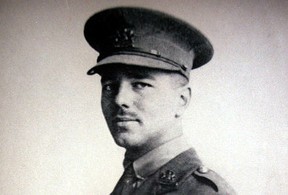 'This book is not about heroes. English poetry is not yet fit to speak of them.
'This book is not about heroes. English poetry is not yet fit to speak of them.
Nor is it about deeds, or lands, nor anything about glory, honour, might, majesty, dominion, or power, except War.
Above all I am not concerned with Poetry.
My subject is War, and the pity of War.
The Poetry is in the pity.'
Wilfred Owen did not live to see his poems published together in a collection. But he planned for that to happen. In May 1918, he even wrote the preface for it. The above is how it began.
A heart-breaking humanity runs an undercurrent through every one of Owen's snapshot glimpses into the front line. He mentions courage and heroism, but more so the fact that no-one would willingly be there. They are living, breathing, thinking, feeling men pushed right to the limits of endurance, then past them.
Owen describes what he sees all around him with a deep compassion. Nor is this solely reserved for those on his own side.
In Strange Meeting, it is a German soldier who tells of what the war has cost him. The richness of his own life, mind and personality ('I went hunting wild after the wildest beauty..') has been extinguished in 'the pity of war, the pity war distilled.' There's guilt too for the Englishman, as the ghostly German tells how sheer exhaustion meant that he couldn't even save his own life.
I am the enemy you killed, my friend.
I knew you in this dark; for so you frowned
Yesterday through me as you jabbed and killed.
I parried; but my hands were loath and cold.
Let us sleep now ...
If time and propaganda would dehumanize those individuals fighting on both sides of the conflict, then Wilfred Owen strikes back with a resounding 'no'. This happened to people just like him, and just like me and you.
Now, for pity's sake, stop it happening ever again.


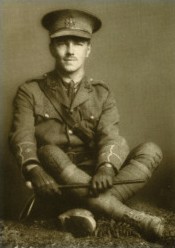 The First World War is always seen through the lens of time or propaganda.
The First World War is always seen through the lens of time or propaganda.


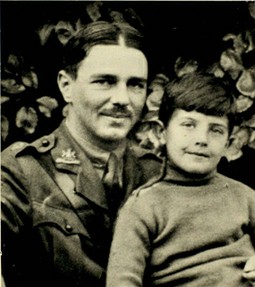 Like Jeremy Paxman, I was also exposed to Wilfred Owen's poetry for the first time at school.
Like Jeremy Paxman, I was also exposed to Wilfred Owen's poetry for the first time at school. 'This book is not about heroes. English poetry is not yet fit to speak of them.
'This book is not about heroes. English poetry is not yet fit to speak of them.





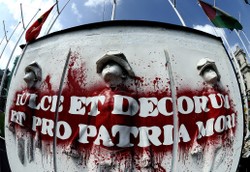

 St Tydecho's Churches in West Waleson 09/03/2014
St Tydecho's Churches in West Waleson 09/03/2014
 Goodies for an Outlander Premiere Partyon 03/06/2015
Goodies for an Outlander Premiere Partyon 03/06/2015
 Holocaust Memorial Day Interview with Rainer Höss, Grandson of Rudolf Architect of Auschwitzon 01/24/2015
Holocaust Memorial Day Interview with Rainer Höss, Grandson of Rudolf Architect of Auschwitzon 01/24/2015
 Romantic Valentine Gifts for an Outlander Fanon 01/16/2015
Romantic Valentine Gifts for an Outlander Fanon 01/16/2015

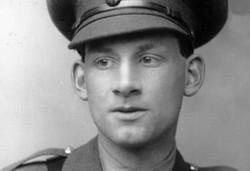
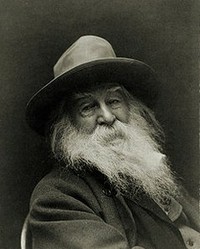
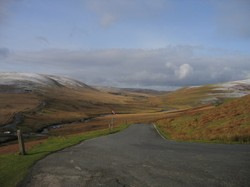
Comments
Mari - You have just introduced me to a poet of whom I knew nothing. Thank you. I, for one, would love to read a whole article on this. There's plenty to be said and to teach us. I tend to think art or novels with regard to the Spanish Civil War. I would like to be exposed to the poetry too.
Kate - I now have an exquisite mental image of muses swapping shifts.
I did read how the WWII war poets felt that they couldn't possibly match the passion of Owen, Sassoon, Graves etc. Plus it had already been said and the message hadn't got through. So they moved onto other things.
Just caught up with this discussion. Second World War poets there were aplenty but they were less emotional in their poetry. Alun Lewis, Edward Thomas, Keith Douglas. Sidney Keyes and Jarrell are just a few of my favourites. Douglas's work seems unemotional at first but it can be very unsettling because of his exact description. One of his best poems, in my opinion, is "Desert Flowers" and in it he mentions World War I poet Isaac Rosenberg (one missing from your list of First WW. poets.
I can't resist quoting a few lines of probably the most famous of Alun Lewis's poems, " All Day it has Rained" as this to me epitomises what I imagine to be the other side of war, the total boredom.
All day it has rained, and we on the edge of the moors
Have sprawled in our bell-tents, moody and dull as boors,
Groundsheets and blankets spread on the muddy ground
And from the first grey wakening we have found
No refuge from the skirmishing fine rain
And the wind that made the canvas heave and flap
And the taut wet guy-ropes ravel out and snap,
All day the rain has glided, wave and mist and dream,
..........................
Don't forget either. the poetry of the Spanish Civil War and that of the Vietnam war. The poetry of the Vietnam War more resembles that of the First WW as the loss of innocence in that one was similar.
I should do an article on this, I think. I've blogged about my love of war poetry but I didn't see it somehow as fitting into Wizzley. I have a lot to learn.
Sorry for going on so much.
good point Rupert ... i can't think of one poet who dealt directly with the war. Plenty of good artists around at that time though - Nash, Sutherland, Spencer etc. Perhaps the muse's had swapped shifts?
That's the absolute tragedy, in a period full of tragedy. You can't help feeling your heart sink further, when you contemplate that what Wilfred described didn't actually end war at all.
Yes, very intense stuff, brilliantly rendered.
Intense stuff! Somehow people involved in WWI saw it as the war to end all wars, although that turned out not to be the case, sadly.
I know that Seigfried Sassoon was actively encouraging writers like Wilfred Owen to put it down in verse. But I doubt that he was the driving force for the whole explosion of First World War poetry.
You're right though. Off the top of my head, I really am struggling to find a Second World War poet of the same quality. Surely there's a biggie we're both missing. I mean there's 'First They Came...' by Pastor Martin Niemöller, but that's just one poem. Mmmm.
And it's really cool that you're named for Rupert Brooke.
Why was it that the Great War gave us so many wonderful poets? In addition to the ones you mention, Rupert Brooke (after whom I was named), John McCrea, Robert Graves, Laurence Binyon come to mind.There were many others. However, I can't think of a single Second World War poet of renown. Perhaps, somebody can enlighten me.